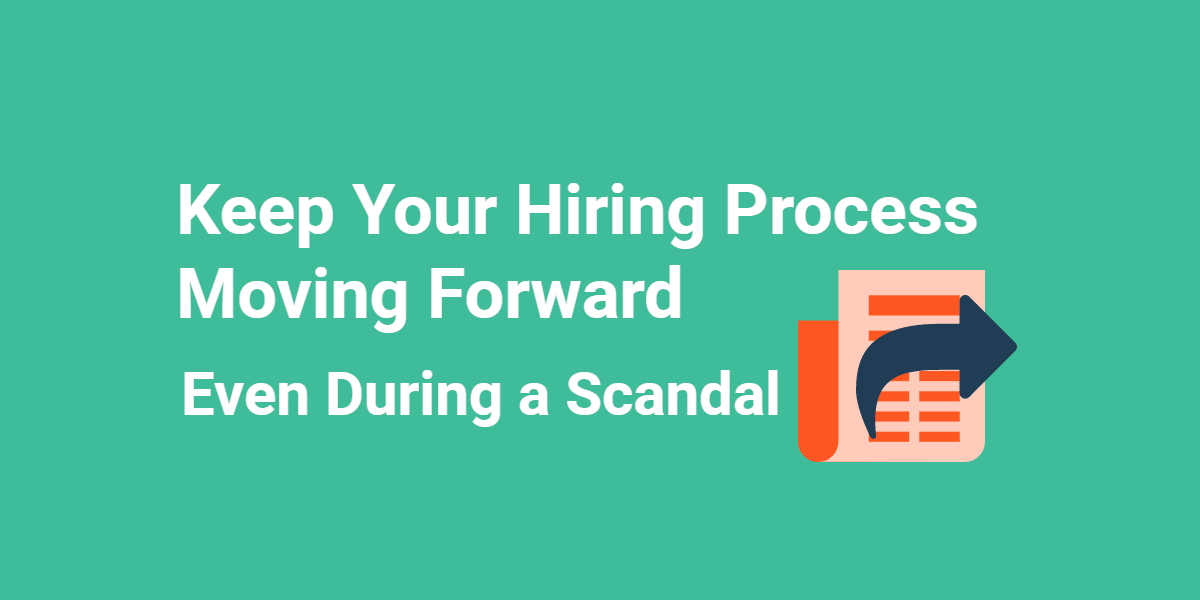First Uber, then Volkswagen, and now Wells Fargo.
2017 isn’t lacking in corporate America scandals — and they don’t seem to be ending anytime soon. The most recent one hitting newsstands is Wells Fargo, which has uncovered up to 1.4 million more fake accounts after digging deeper into the bank’s broken sales culture. These accounts have cost about 190,000 accounts to be slapped with unnecessary fees.
While it’s obvious to see how the scandal continues to affect customers, Wells Fargo’s hiring process is inevitably suffering as well. This means as Tim Sloan, Wells Fargo CEO, is off-putting out PR fires and attempting to save the company’s image, recruiters will be working equally as hard to ramp up recruiting efforts.
Convincing quality talent that your company is worth their while after a scandal — large or small — is an intimidating feat. Here’s how you can keep up with your hiring process — no matter what challenges your company is facing:
1. Make one statement and stick to it.
 For Wells Fargo recruiters, I suggest they ask one question and make one statement.
For Wells Fargo recruiters, I suggest they ask one question and make one statement.
“Is this an isolated event and do I believe senior leaders are committed to fixing?”
If the answer is yes, I’d make the following statement to candidates:
“At Wells Fargo we acknowledge we’ve made mistakes and jeopardized the trust and loyalty of our customers. We’re not running away from our responsibilities. We also acknowledge that adversity is the very best builder of character. Our current and future employees are the most important part of regaining customer trust. This work is not for the faint of heart. If you’re interested in being on the forefront of the most important work an iconic US company will ever make, we should talk.”
The worst thing a recruiter can do during the hiring process is justify, blame, reject responsibility, sugar coat or paint the situation as unicorns, butterflies, and babies. Recruiters need to be real and credible as they are role models for what Wells Fargo stands for moving forward.
Hugh Blane, President of Claris Consulting
2. Own up to your imperfections.
 I don’t believe many small businesses will ever have to face such a public relations debacle that United went through a few months ago or what Uber is currently going through. However, last summer we did have a PR miniature nightmare on our hands.
I don’t believe many small businesses will ever have to face such a public relations debacle that United went through a few months ago or what Uber is currently going through. However, last summer we did have a PR miniature nightmare on our hands.
You see one, of the small business owners who uses our platform to cut grass accidentally let one of our customer’s dog out of the fence and lost her dog. It was an unfortunate situation that we had little control over. However, our customer took to social media and local Facebook groups.
They proceeded to blast that the GreenPal platform lost her dog. Hateful comments, direct messages, and hateful emails ensued.
I remembered reading how Steve Jobs handled the iPhone 4 “dropped call” public relations disaster. He just said publicly, “phones aren’t perfect, we aren’t perfect.”
Taking a page out of that playbook, I calmly handled the situation in a similar fashion and responded to all the online chatter saying “our vendors aren’t perfect, and our platform is not perfect, we are not perfect.” In the end, it all worked out. We joined forces with the local service provider, found her dog, and were able to give the story a happy ending.
Bryan Clayton, CEO of GreenPal
3. Highlight your strengths.
 General recruiting should highlight the company’s financial and industry viability, stability, and continued growth. Recruitment advertising should also mention the company’s past or recent humanitarian, volunteer, or corporate social responsibility successes.
General recruiting should highlight the company’s financial and industry viability, stability, and continued growth. Recruitment advertising should also mention the company’s past or recent humanitarian, volunteer, or corporate social responsibility successes.
When working with a very high-profile company that was facing a public relations challenge, the company failed to address the concerns of its employees. Instead, they focused on appeasing the general public, media, and key stakeholders. When resulting budget cuts resulted in job cuts, terminated employees created more negative press and poor community relations for the company.
The employees who remained lost loyalty for the company because they felt like the company did not care about them. This had a huge impact on the company not being able to recruit for new or vacated positions as well as being able to maintain essential personnel.
We helped HR craft authentic language that made past and present employees aware of major updates regarding the issue. We also consistently communicated the company being able to survive and the company’s concern for employee welfare.
As a result, employee morale improved, its public image improved, HR significantly improved its recruitment of numerous highly qualified candidates, and the company improved its ability to retain great, competent, and dedicated employees.
Dr. Reneé Carr, CEO of The Carr Advisory Group
4. Stick to the program.
 It’s not your job as a recruiter to resolve the scandal or to come up with positioning or public statements. However, it is your responsibility to know what that strategy is and to only use approved language when talking about the scandal. Mixed messaging can increase reputational risk. Should the scandal result in a lawsuit, contradictory public statements can undermine the company’s litigation strategy.
It’s not your job as a recruiter to resolve the scandal or to come up with positioning or public statements. However, it is your responsibility to know what that strategy is and to only use approved language when talking about the scandal. Mixed messaging can increase reputational risk. Should the scandal result in a lawsuit, contradictory public statements can undermine the company’s litigation strategy.
For a client facing allegations of sex discrimination in employment practices, we countered the narrative by (among other things) getting high-profile regional media coverage of the company’s commitment to diversity at all levels, profiling a number of its C-Suite women executives.
Warren Cooper, Senior Communications Director of Evergreen Partners
How do you keep your hiring process alive and well during public company struggles? Let us know!











